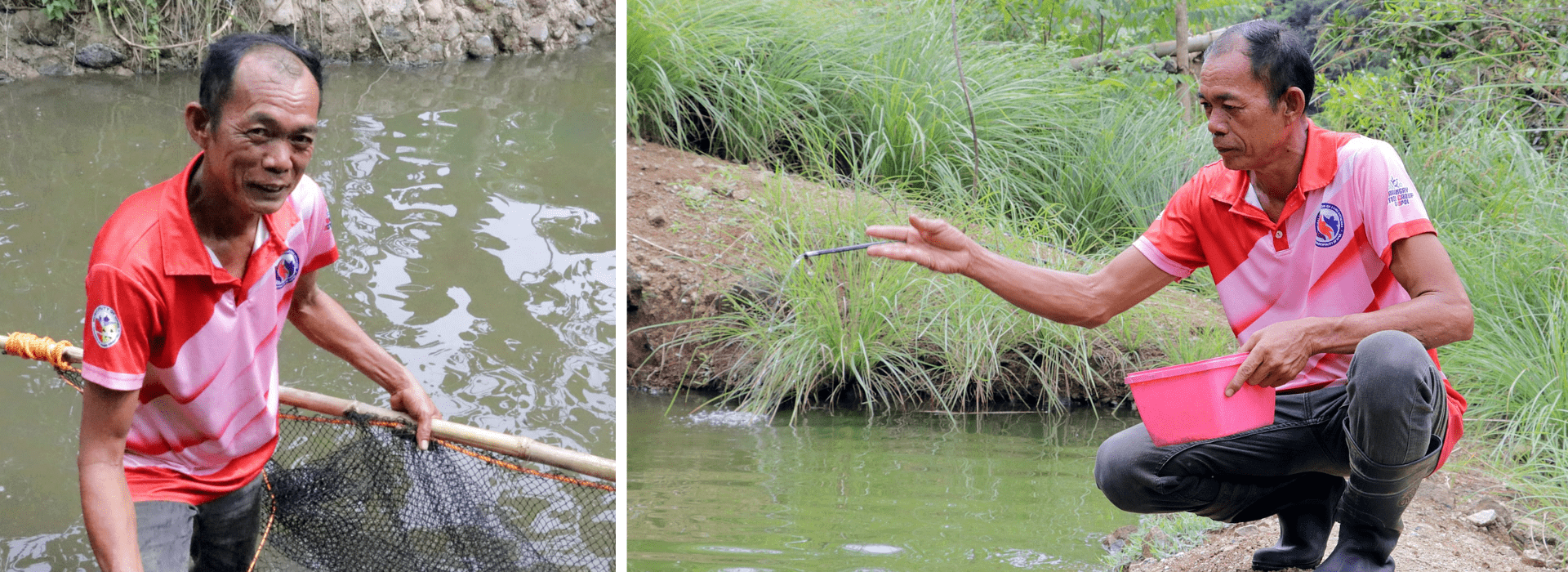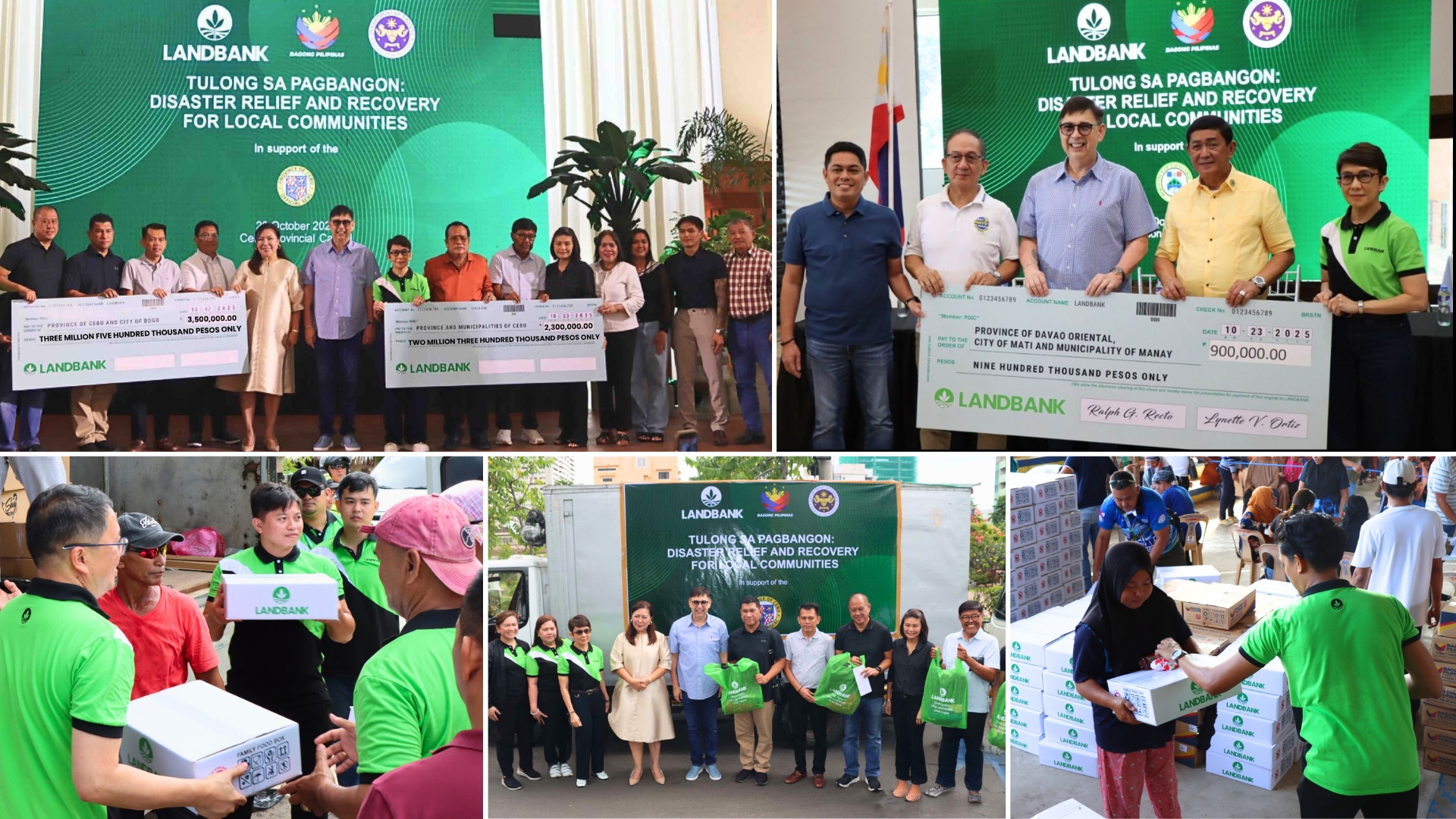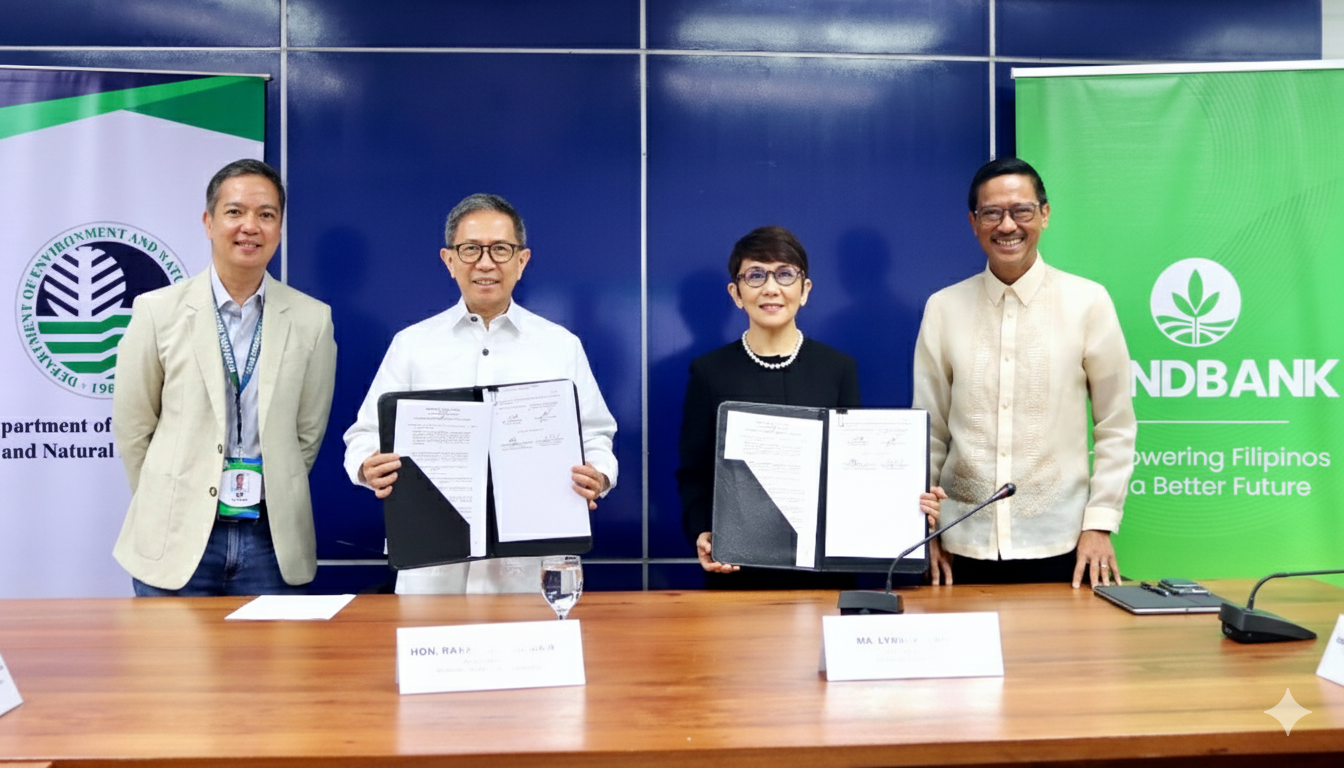
Farmer Eric A. Janolino from the Municipality of Opol in Misamis Oriental ventured into tilapia farming and expanded his income with the financial assistance extended by LANDBANK and the Department of Agriculture under the Agricultural Competitiveness Enhancement Fund (ACEF) Lending Program.
OPOL, Misamis Oriental – For over 30 years, Eric A. Janolino has dedicated his life to farming palay, corn, and various vegetables in the remote sitio of Tingkulan in Barangay Bagocboc. As someone without formal education, farming was the only way Eric knew to support his growing family. Yet, despite decades of hard work, life was a constant uphill battle.
To fund each planting season, Eric used to rely on informal lenders who charged exorbitant and crippling interest rates, often leaving him with little to no profit after the harvest. This made it nearly impossible to improve his farming methods or invest in the necessary resources to grow his livelihood.
Adding to his struggles, Eric lived in an isolated community with limited access to government services. The barangay is accessible only by motorcycle, requiring a 30-minute ride along rugged, unpaved roads and crossing several rivers from the town proper. This makes transporting crops to the market both difficult and costly, eating further into his already limited earnings.
In search of better income, Eric tried his luck in Manila, taking on jobs as an electrician and security guard. But he felt out of place in the bustling city, and his heart pulled him back to the fields he had always called home. Returning to farming, however, presented the same persistent struggles—high-interest loans and limited resources left him with little to provide for his wife and three children.
A new beginning
Hope came in 2023 when Eric learned about the financial assistance available for small farmers like him, facilitated by LANDBANK in partnership with the Department of Agriculture (DA). Under the Agricultural Competitiveness Enhancement Fund (ACEF) Lending Program, he secured a ₱100,000 loan with a low annual interest rate of 2%, or only about ₱2,000 for the entire year.
Eric was guided by LANDBANK and DA through every step of securing the loan—something he never thought possible due to his limited reading and writing skills.
“Dati, kanya-kanyang diskarte ang mga tao dito para magkaroon ng puhunan sa pagsasaka. Pero noong dumating ang LANDBANK, ipinaliwanag nila kung paano kami makakapag-avail ng murang pautang sa ilalim ng ACEF program. Hindi na kami nahirapan sa pagbabayad ng malalaking interes sa 5-6,” Eric shared.
With LANDBANK’s financial support, Eric ventured into tilapia farming and invested in building three fishponds, under the guidance of the Bureau of Fisheries and Aquatic Resources (BFAR) Region 10. To ensure success, he completed a BFAR training on tilapia production, equipping him with the knowledge and skills to maximize his new venture.
A ripple effect of growth
The impact of tilapia farming on Eric’s life was profound. His once meager earnings for his family grew into a steady and reliable income. He invested his profits to buy a carabao and a horse to help transport goods to market, raised pigs for extra income, and even renovated their home. Most significantly, Eric was able to send his children to school—something he once thought was out of reach.
“Malaki ang pasasalamat ko sa LANDBANK dahil hindi sila nag-atubiling tumulong sa katulad naming mga mahihirap. Ngayon, meron na kaming mga hayop na pangkargada sa aming mga produkto at pang-araro ng bukid, kaya malaki talaga ang naitulong ng LANDBANK sa aking pamilya. Anuman ang iyong kalagayan at pangangailangan, nandiyan sila para magbigay ng tulong at suporta,” Eric said.
Motivated by the opportunities provided by LANDBANK and DA, Eric inspired his fellow farmers to achieve the same success. Fourteen other farmers from his barangay availed themselves of the affordable credit facilities under the ACEF Lending Program and embraced tilapia farming. Like Eric, they soon began to see their livelihoods—and their incomes—flourish, enabling their families to better meet their needs and secure a brighter future.
Empowering small farmers and fishers nationwide
LANDBANK serves as the conduit bank of DA in implementing the ACEF Lending Program, which aims to boost the productivity of marginalized agricultural players through the extension of accessible credit assistance, among other support initiatives.
Under the Program, farmers and fishers can borrow up to P1 million, while cooperatives, associations, and micro, small, and medium enterprises (MSEs) may access loans up to P5 million for the purchase of farm inputs and equipment, as well as the acquisition or establishment of agri-based production and processing machinery, equipment, and facilities.
As of December 2024, LANDBANK has released a total of ₱14 billion in loans under the ACEF Lending Program benefitting 95,301 borrowers nationwide, 98% of which are small farmers and fishers.
ABOUT LANDBANK
LANDBANK is the largest development financial institution in the Philippines promoting financial inclusion, digital transformation, and sustainable national development. Present in all 82 provinces in the country, the Bank is committed to provide accessible and responsive financial solutions to empower Filipinos from countryside to countrywide.

LANDBANK aids recovery of quake-affected communities in Davao and Cebu
LANDBANK reaffirmed its commitment to disaster response and recovery by extending ₱3.2 million in financial assistance and ₱3.1 million worth of relief packs to earthquake-hit communities in Davao Oriental and Cebu on October 23, 2025. Finance Secretary and LANDBANK Chairman Ralph G. Recto, together with President and CEO Lynette V. Ortiz, led the simultaneous relief operations. “LANDBANK remains steadfast in providing timely assistance to our fellow Filipinos during times of crisis. Beyond immediate relief, we are equally focused on supporting the long-term recovery and rebuilding of affected communities,” said LANDBANK President and CEO Ortiz. In Davao Oriental, ₱500,000 was turned over to the provincial government, and ₱200,000 each to the City of Mati and Municipality of Manay. LANDBANK also distributed 1,000 grocery packs to displaced families, partly funded by voluntary donations from Bank employees. In Cebu, ₱2.3 million in financial aid was provided to 11 municipalities, including ₱500,000 each to Medellin, San Remigio, and Daanbantayan, and ₱100,000 each to Tabogon, Tabuelan, Sogod, Borbon, Catmon, Bantayan, Sta. Fe, and Madridejos. A total of 2,600 relief packs containing essential items, also funded in part by employee contributions, were also turned-over to the local Municipal Social Welfare and Development Offices of the said municipalities and Bogo City. Previously, LANDBANK extended ₱4.9 million in aid to Cebu Province, Bogo City, and Masbate, distributed 2,000 food relief packs, donated 32 portable water filtration systems, deployed mobile ATMs, and ensured branch operations resumed promptly. Beyond immediate relief, LANDBANK rolled-out financial programs to support long-term recovery, including the CARES Plus for MSMEs and cooperatives, Electronic Salary Loan (eSL), EasyCash for Emergencies, PeER Loan for pensioners and government employees, and Emergency Loans of up to ₱25,000. LANDBANK services remain accessible via 409 branches, over 2,900 ATMs nationwide, and online through the LANDBANK Mobile Banking App (MBA), iAcces, weAccess, and Link.BizPortal. For more information, visit any LANDBANK branch or call the Customer Care Hotline at (02) 8405-7000.
LEARN MORE
LANDBANK, DENR boost support for sustainable water and environmental initiatives
LANDBANK President and CEO Lynette V. Ortiz (2nd from right) and DENR Secretary Raphael P.M. Lotilla (2nd from left) formalize a partnership to strengthen the country’s water security and environmental resilience through the signing of a Memorandum of Understanding (MOU) on 15 October 2025 at the DENR Central Office in Quezon City. They are joined by LANDBANK Senior Vice President Gonzalo Benjamin A. Bongolan (rightmost) and DENR Undersecretary Carlos Primo C. David (leftmost). State-run LANDBANK and the Department of Environment and Natural Resources (DENR) have partnered to strengthen the country’s water security and environmental resilience through enhanced collaboration on water-related projects. The partnership was formalized through a signing of a Memorandum of Understanding (MOU) led by LANDBANK President and CEO Lynette V. Ortiz and DENR Secretary Raphael P.M. Lotilla on 15 October 2025 at the DENR Central Office in Quezon City. They were joined by LANDBANK Senior Vice President Gonzalo Benjamin A. Bongolan and DENR Undersecretary Carlos Primo C. David. Under the agreement, LANDBANK and the DENR will jointly promote sustainable water resource management by extending financial and technical support to water districts, local government units (LGUs), and other institutions engaged in water supply, sanitation, and conservation initiatives. “LANDBANK reiterates its commitment to provide accessible financing to water districts, LGUs, and other entities engaged in water supply, sanitation, and conservation projects. Together, we aim to build resilient communities, strengthen public health, and secure the country’s water future,” said LANDBANK President Ortiz, underscoring the urgency of sustainable water solutions in the face of climate-related challenges. The partnership builds on the Bank’s existing H2OPE Lending Program (Water Program for Everyone), through which LANDBANK has already released ₱5 billion in financing to 35 borrowers nationwide as of August 2025. This enhanced collaboration will further scale up support for water-related initiatives nationwide. LANDBANK will allocate funds and design financing programs for eligible projects, promote concessional lending opportunities, and provide related financial services. As a Direct Access Entity (DAE) to the Green Climate Fund (GCF), LANDBANK will also partner with the DENR to develop and manage projects for GCF funding. “Integrated water management is a challenge that we need to be constantly working on. With LANDBANK's support as the implementing agency for the loan facility, we can move forward with ease, without having to establish a new system and new agencies to administer the same. Through this partnership, we will also explore a responsive loan instrument for water service providers to better support their operations and improve access to safe water across communities,” said DENR Sec. Lotilla. For its part, the DENR will identify priority water programs and provide technical guidance in water resource management, conservation, and environmental impact assessments. It will likewise assist eligible proponents in securing necessary environmental permits and approvals. Eligible projects include the development and rehabilitation of water supply systems, wastewater treatment, watershed protection, and other climate-resilient water resource projects aligned with national policies and UN Sustainable Development Goal (SDG) 6 on clean water and sanitation for all.
LEARN MORE
Harvest of Dreams: Citrus pioneer turns Malabing Valley into land of opportunities
In Nueva Vizcaya, talk about citrus and one name always comes to mind. Known as the province’s Father of Citrus for pioneering the local citrus industry, farmer Alfonso Namuje, Jr. has long been recognized as a local hero, whose vision and determination turned Malabing Valley into a thriving citrus hub. “Nung bata pa ako, mahilig na ako magtanim ng mga halaman. Baka yun ang ibinigay ng Diyos sakin,” Mr. Namujhe recalls. From a young age, he was drawn to plants, a passion that led him to study agriculture in college. But life led him to a different direction. He found himself working at a pig farm in Laguna, where he eventually became a manager. It was only after seeing how the fruits he planted in his backyard were celebrated by the community that he realized his true calling. “Yung mga prutas na tinanim ko, pinag-piyestahan ng mga tao. Naisip ko na ito pala ang magpapayaman sa lugar,” he says. This inspired him to return to Malabing Valley and dedicate himself fully to uplifting his hometown through citrus farming. Before Mr. Namujhe introduced citrus, the valley’s main crops were corn and coffee. However, years of armed conflict had turned the area into a settlement for former rebel forces making financial institutions wary of investing. Still, he believed that providing livelihoods could be a powerful tool for change. “If there’s a marketable farm product in the area, the government will take notice. Roads, electricity, infrastructure — they will follow,” he says. Guided by this vision, he introduced citrus to the valley. He then left his well-paying job and moved back to Malabing Valley with his family. Together, they began building the foundation for what would become a thriving citrus hub. He established the Namujhe Integrated Farm, and shared knowledge with fellow farmers through the Malabing Valley Multi-Purpose Cooperative (MVMPC), which he helped organize. As interest in citrus grew, more farmers sought guidance. Through the MVMPC, farmers gained access to techniques, financial support, and farm inputs, while his own farm became a living classroom and an agri-tourism site. A critical part of this transformation was LANDBANK which believed in Mr. Namujhe’s vision when others refused to. The Bank provided the financial support needed for farmers to invest in inputs and expand operations. Citrus farming soon became a viable industry, improving livelihoods and attracting government attention — roads were built, connecting communities and markets, and what once took a five-day carabao ride to reach Solano could now be traversed in hours. Through years of research and experimentation, Mr. Namujhe refined orchard management, introduced new cultivars, and shared his knowledge with students, co-farmers, and visitors. Malabing Valley became the heart of citrus production in Cagayan Valley, with Kasibu officially recognized as the Citrus Capital of Luzon. “Nagpapasalamat talaga ang mga tao. They accept na ako talaga ang dahilan na nag-improve ang kanilang buhay. Sa akin, that’s my achievement. I can be proud of it,” he shared, reflecting on the gratitude of local farmers. “Si Dad, ibang level talaga. One man’s dream, naging isang community. Isang tao lang ang gumawa nito, and pulled everybody up,” says his daughter Josephine, who was inspired to follow his father’s footsteps. “Yung mga politician sinasabi nila, 'Alam mo, kami makakalimutan, pero ikaw – yung binigay mo na legacy dito, I don’t think makakalimutan ka,’” Josephine proudly added, highlighting how his father’s contributions have left a lasting imprint on the community. Mr. Namujhe’s efforts provided not just a new crop, but a new foundation for success, empowering countless farmers by granting them access to innovative citrus production techniques, financial support, and necessary farm supplies. Through his work, many young people were able to pursue their education, and several families successfully built quality homes and acquired properties in the lowlands. His leadership and advocacy significantly contributed to creating job opportunities, effectively improving the livelihood of the entire community. His pioneering work has earned him national recognition. Most recently, LANDBANK’s Gawad TANYAG Awards honored him as Ulirang Magsasaka, acknowledging the impact of his leadership, innovation, and community transformation. “LANDBANK is doing their work, kaya I'm loyal to them. Maraming pumupunta sa akin na iba. Pero hanggang nandiyan pa ang LANDBANK, kasama ko yan,” he added. Through his vision, determination, and unwavering commitment to his community, Mr. Namujhe turned a once-overlooked valley into a thriving citrus hub — leaving a legacy that will continue to inspire generations.
LEARN MORE